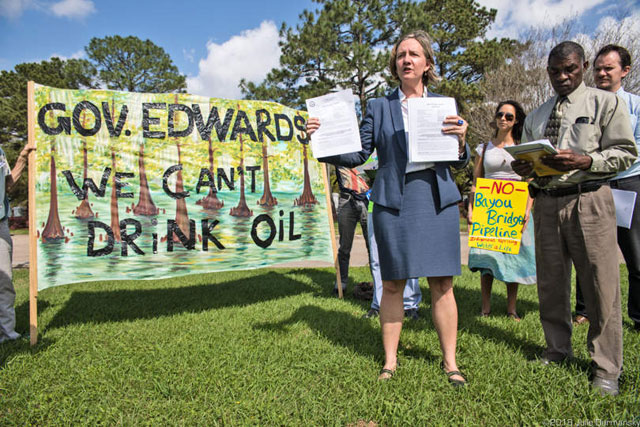
Support justice-driven, accurate and transparent news — make a quick donation to Truthout today!
Opponents of the Bayou Bridge pipeline accused Louisiana Governor John Bel Edwards of meeting with a representative of the oil and gas industry while refusing to meet with activists and communities affected by the pipeline’s construction. They further allege that the administration has instead placed them under surveillance, pointing to similar treatment of Dakota Access pipeline opponents in North Dakota in 2016. Their claims are based in part on emails and other public records released by the state.
The activists brought their grievances to the Democratic governor’s home and office on March 1, holding a press conference in front of the Governor’s Mansion in Baton Rouge and then occupying the foyer to his office in the State Capitol for over an hour.
“The Bayou Bridge pipeline should be called the John Bel pipeline,” Louisiana Bucket Brigade founder and director Anne Rolfes declared at the press conference. In her view, “any accidents that will happen” related to the pipeline lead back to the Governor. He had the power to stop it, she said, but chose not to.
At the press conference, representatives from the HELP Association, 350 New Orleans, L’eau est La Vie (Water Is Life) camp, and the Center for Constitutional Rights also expressed disappointment in what they described as the state government’s cozy relationship with industry.
Louisiana Bucket Brigade read aloud emails about the Bayou Bridge pipeline from the Edwards administration and industry that were obtained by the Center for Constitutional Rights (CCR), a New York-based legal and educational nonprofit.
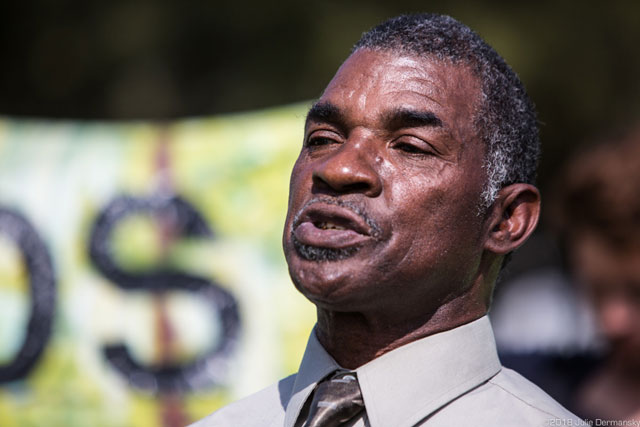 Pastor Harry Joseph of the Mount Triumph Baptist Church in St. James, where the pipeline will terminate, speaking at the press conference in Baton Rouge. (Photo: © Julie Dermansky)
Pastor Harry Joseph of the Mount Triumph Baptist Church in St. James, where the pipeline will terminate, speaking at the press conference in Baton Rouge. (Photo: © Julie Dermansky)
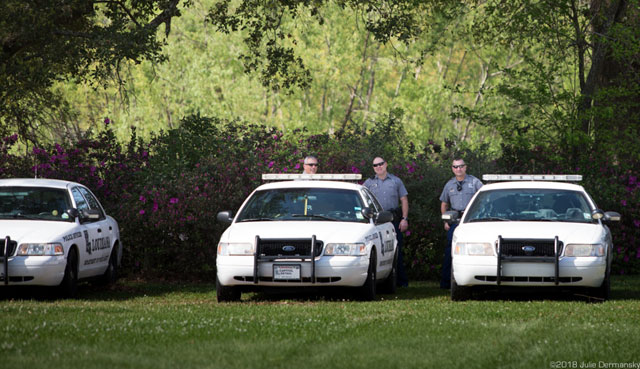 Security next to the press conference in Baton Rouge. (Photo: © Julie Dermansky)
Security next to the press conference in Baton Rouge. (Photo: © Julie Dermansky)
The governor, who voiced his support for the pipeline early on, has not commented on a federal judge’s recent ruling halting construction of the project through the Atchafalaya Basin, an environmentally sensitive National Heritage Area.
The pipeline is a joint venture between majority stakeholder Energy Transfer Partners, the company behind the Dakota Access pipeline, and Phillips 66 Partners, LP. Pipeline construction along its route from Lake Charles, near the Texas border, to St. James, about 60 miles west of New Orleans, began in January.
CCR attorney Pamela Spees grew up in Lake Charles, Louisiana, one of the communities affected by the pipeline. She said in a press release that the emails show how “the deck is stacked against people in Louisiana who stand in opposition to the ongoing destruction and harm caused by the Oil and Gas industry. The indications of monitoring and surveillance of local advocates and small organizations by the Governor’s Office of Homeland Security and Emergency Preparedness are particularly concerning. It is astounding that the resources of so many law enforcement agencies are trained on watching these organizations and communities trying to exercise their rights to be heard.”
In addition, Spees found it “deeply troubling that not one email released by the Louisiana Department of Environmental Quality contained any discussion of or expressions of concern by people in the agency about the alarming accident history of the companies involved in the Bayou Bridge project.”
CCR is still fighting to get other public records related to the Bayou Bridge pipeline, and has appealed two cases it lost. One is against Bayou Bridge Pipeline LLC, in which the nonprofit sought records concerning the company’s use of eminent domain. And the other is against Louisiana’s St. Charles Parish Sheriff’s Office and Sheriff Greg Champagne for failing to release public records related to trips he and some of his deputies took to North Dakota to observe how law enforcement was responding to the Dakota Access pipeline protests.
“We saw a dangerous blurring of the lines between law enforcement and private corporations at Standing Rock,” Spees said. “Louisiana residents have a right to know what role local officials played in that situation and how it relates to events playing out closer to home.”
Surveillance of Opponents of the Bayou Bridge Pipeline
Dominic Renfrey, a representative with the Center for Constitutional Rights, informed me that Bayou Bridge Pipeline LLC is employing the firm Hub Enterprises to provide security for the company, based on sightings at pipeline construction sites.
Energy Transfer Partners spokesperson Alexis Daniel told me, “The safety of our employees and the communities in which we live and work is our top priority. In order to ensure that, we do have security plans in place and we do communicate with law enforcement agencies as appropriate. Beyond that, we do not discuss details of our security efforts.”
CCR’s Renfrey also said that documents released last week indicate the Governor’s Office of Homeland Security and Emergency Preparedness (GOHSEP) “might be involved in surveillance.” The GOHSEP director sent to state regulatory and law enforcement agencies, including the Department of Environmental Quality (DEQ), the Department of Natural Resources, the Louisiana State Police, and the Louisiana National Guard. The agency also prepared a report about the L’Eau Est La Vie Camp, contrasting it to the resistance camps against the Dakota Access pipeline.
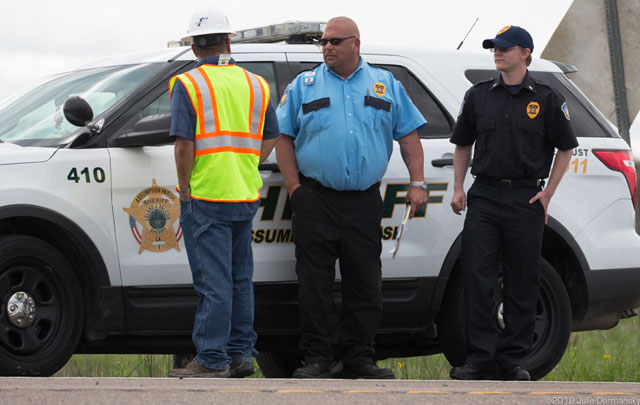 Hub Enterprises security personnel across the street from a Bayou Bridge pipeline construction site that activists shut down temporarily on February 26 during a direct action leading to the arrest of three protesters. (Photo: © Julie Dermansky)
Hub Enterprises security personnel across the street from a Bayou Bridge pipeline construction site that activists shut down temporarily on February 26 during a direct action leading to the arrest of three protesters. (Photo: © Julie Dermansky)
GOHSEP Communications Director Mike Steele told The Advocate that there’s nothing sinister about his agency’s role. “The agency keeps an eye on issues that may, at some point, draw big crowds requiring security, traffic control, or crowd control. Homeland security may have an ominous connotation,” he said, “but they aren’t spies.”
“It’s not surveillance. It’s letting these agencies know that these matters are ongoing,” Steele said.
There was plenty of security on hand at the March 1 press conference and impromptu visit to the governor’s office. Some of the security personnel were impossible to identify because they remained in vehicles with tinted windows.
 Anne Rolfes, founder of the Louisiana Bucket Brigade, trying to figure out who was in an SUV monitoring the press conference across from the governor’s mansion. (Photo: © Julie Dermansky)
Anne Rolfes, founder of the Louisiana Bucket Brigade, trying to figure out who was in an SUV monitoring the press conference across from the governor’s mansion. (Photo: © Julie Dermansky)
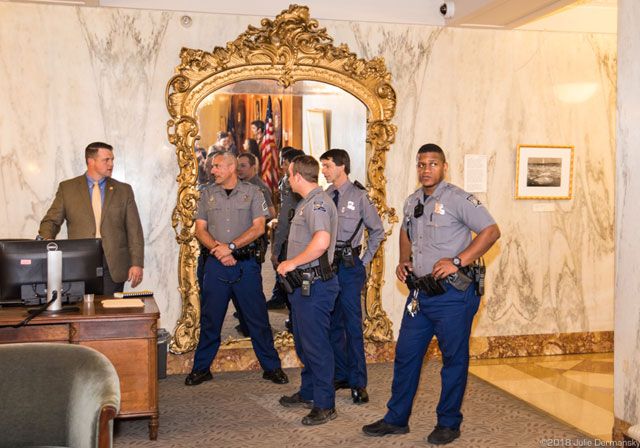 Security inside the foyer in front of the governor’s office. (Photo: © Julie Dermansky)
Security inside the foyer in front of the governor’s office. (Photo: © Julie Dermansky)
The documents so far obtained by CCR don’t indicate that any state agency hired a private security firm to surveil opponents of the pipeline. However, if one did, it wouldn’t be the first time a government agency in Louisiana hired a private firm to supplement its resources.
Last year, New Orleans Mayor Mitch Landrieu’s administration hired Trident Response Group, a private security firm based in Texas, for risk assessment, surveillance, intelligence gathering, and extra security at sites where Confederate monuments were slated for removal.
Landrieu’s administration defended the move to hire a private security firm after documents from an open records request showed the city paid over $700,000 dollars to Trident in May while the city prepared to remove the monuments. While denying that the city spied on local groups on either side of the issue, the city has not been transparent about what services Trident provided.
Take ‘Em Down Nola, the group pushing for the removal of the Confederate monuments, suggested that Trident may have hacked some of its members’ emails and social media accounts and possibly infiltrated the group.
Trident shares similarities with TigerSwan, one of the private security firms employed by Energy Transfer Partners in North Dakota, and Hub Enterprises. All three companies’ websites tout staff that include former military personnel.
TigerSwan’s license application with the Louisiana State Board of Private Security was turned down last year. The denial was based on the pending litigation against the company for allegedly operating in North Dakota without a permit.
Some Bayou Bridge opponents believe the company was working in Louisiana without a license before its application was turned down.
In February 2017, James “Spider” Marks spoke in favor of the Bayou Bridge pipeline at a permit hearing. He identified himself as a retired US Army major general and president of a corporate advisory firm, but did not disclose that he also sits on TigerSwan’s board of advisors.
The Louisiana Bucket Brigade says that emails from GOHSEP reveal Louisiana officials are aligned with a growing national trend of surveillance intended to intimidate citizens exercising their First Amendment rights, a finding the group considers alarming.
“Since the Standing Rock camp opposing the Dakota Access pipeline in North Dakota was disbanded last year, 56 bills that heighten the risk and criminal penalties of dissent have been introduced across 30 states,” reads a press release from the organization. “Many of these bills seek to frame protests as ‘riots’ and activists as ‘terrorists’ or ‘jihadists,’ in attempts to criminalize protected free speech activity.”
Several states have even gone as far as introducing or passing bills that critics say would specifically criminalize pipeline protests.
“The documents reveal an unacceptable disparity in the public agencies’ treatment of pipeline and industry representatives in contrast to the communities they’re obligated to serve,” Spees said. She told me that CCR will continue to seek more information from Louisiana’s public agencies because the documents already obtained suggest there is more to the story.
Energy Transfer Partners spokesperson Alexis Daniel told me, “The safety of our employees and the communities in which we live and work is our top priority. In order to ensure that, we do have security plans in place and we do communicate with law enforcement agencies as appropriate. Beyond that, we do not discuss details of our security efforts.”
I asked Governor Edwards’ office what he would say to those who feel he is willing to meet and listen to representatives of the oil and gas industry but not the Bayou Bridge pipeline’s opponents, including those directly impacted by the project. Shauna Sanford, a representative from the governor’s office, said, “We don’t have a comment at this time.”
Press freedom is under attack
As Trump cracks down on political speech, independent media is increasingly necessary.
Truthout produces reporting you won’t see in the mainstream: journalism from the frontlines of global conflict, interviews with grassroots movement leaders, high-quality legal analysis and more.
Our work is possible thanks to reader support. Help Truthout catalyze change and social justice — make a tax-deductible monthly or one-time donation today.